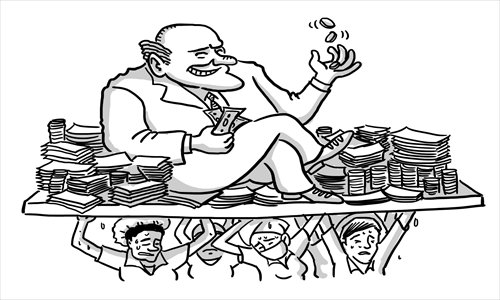Global profits built on Bangladesh deathtraps

The supermarkets of Thailand are full of piles of cheap clothes marked "Made in Bangladesh."
Due to high costs, the global garment industry seems to be moving to countries such as Bangladesh and Cambodia in recent years.
In Bangladesh, attracting garment investment and getting orders from Europe and the US is not only a matter of whether the country can sustain its economic development but also a matter of survival for families trying to escape extreme poverty.
The fiery collapse of a garment factory in Bangladesh last month reflects how such issues become globalized.
If those workers no longer risk their lives to earn a few dollars to feed their families, they may possibly be driven into extreme poverty again. Obviously they have few choices.
But meanwhile, the economic situation in most developed countries is gloomy. The incomes of consumers have been shrinking and unemployment rate is rising. These further bring down the room for price rises in clothes.
The role of the market in the economically globalized world has a huge transnational impact.
Large multinational enterprises, the monopolies of trade companies and control over pricing rights make it hard for the economic operations of countries like Bangladesh to remain independent.
Currently, when industrial giants take part in transnational production activities, they always resort to the old trade order, letting consumers in developed countries enjoy low-price products while turning a blind eye to the safety standards of outsourced production.
After the collapse of the garment factory in Bangladesh, among the nearly 30 European and US fashion retailers that dealt with the factory, only a few have signed up to a new agreement called the Accord on Fire and Building Safety in Bangladesh.
Two problems have been exposed here.
One is how individual enterprises in Bangladesh seek their own profits regardless of the cost in lives.
The other is caused by unfair global trade order. The latter makes the transformation of the first even more difficult in the long term.
The unfair global trade order has caused a dilemma similar to the colonial system.
In the British colonial production system, the profit created by economic activities in Bangladesh was exploited. Right now, Bangladesh is constrained by the profit exploitation of large transnational companies.
In recent years, the Bangladeshi government has been striving to attract foreign investment and promoting the development of the export and processing industry.
Nonetheless, due to its weak economic foundation, poor international competitiveness, low governing capabilities and lack of leverage in the international community, the country's economic development has become trapped.
There is a widespread consensus that underdeveloped countries such as Bangladesh should be granted more rights in the global trade order and that they should have the chance to participate in the trade rules-making process.
After all, it is a matter of how profit can be shifted from the upper end to the lower end through reconstruction of orders.
This will not only provide an international environment for these countries to make good governance, but also drive the development of the global economy.
Nonetheless, the difficulty lies in how to make developed countries give up the power they have already gained and give way to the interests of underdeveloped countries.
The series of accidents in Bangladesh show that neither the current model nor the value chain controlled by developed countries is sustainable.
If the global production chain shifting from the upper end to the lower end is an irreversible trend, the problems of Bangladesh will become the problems of the West. It is Western countries that are bound to bear the consequences.
Western consumers have relied more and more on their systemic advantages, but they are losing such qualifications. The unfair global trade system undermines their attempts to leverage the power of democracy and human rights.
The author is a senior editor with the People's Daily. He's now stationed in Bangkok. dinggang@globaltimes.com.cn